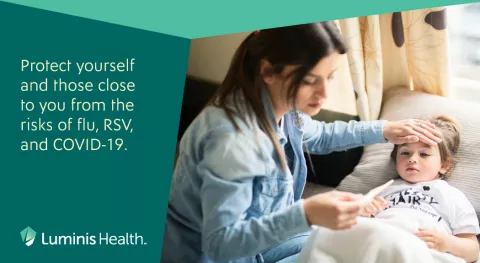
Should my child get a COVID-19 vaccine? Many parents and guardians are asking this question, especially before the first day of school. Here are some answers to common concerns.
Is My Child Eligible?
Right now, anyone 12 and older can get the Pfizer vaccine. If your child is 18 and older, they are eligible to receive Pfizer, Moderna or Johnson & Johnson. The Centers for Disease Control and Prevention (CDC) and the American Academy of Pediatrics recommend children get the first vaccine available to them.
How Does The Vaccine Work?
COVID-19 vaccines essentially teach your immune system to recognize and make antibodies to fight the virus. After the second dose, it takes about two weeks for your body to build up immunity to the virus that causes COVID-19. Full immunity to the Johnson & Johnson dose occurs two weeks after the single dose. It is still unclear how long immunity from the vaccine will protect people.
Is The Vaccine Safe For Children?
All vaccines are very effective at preventing serious illness, hospitalization and death. After getting the vaccine, you can still get the virus, but cases are less severe and bad outcomes significantly reduced. Vaccines also dramatically reduce asymptomatic infection, which is important in decreasing the overall transmission of COVID-19.
What About Side Effects?
Like adults, some, but not all, children experience minor side effects. They can include:
- Pain, redness, and swelling at the injection site
- Fever
- Chills
- Headache
- Fatigue
- Nausea
- Pain in muscles
These symptoms typically last 24 to 48 hours. According to the CDC, there are no known long-term effects from the COVID-19 vaccine.
I’ve Heard A Lot About Myocarditis, Should I Be Concerned?
Myocarditis, or inflammation of the heart muscle, is an extremely rare side effect. According to the CDC, a small number of adolescents and young adults have experienced mild cases of myocarditis after getting the COVID-19 vaccine. It is mainly seen in males ages 16 to 30 and can include abnormal heart rhythms, shortness of breath or chest pain. Since most recover on their own, it is still safer to get the vaccine rather than COVID-19 because the virus can affect the heart.
Does The COVID-19 Vaccine Cause Female Infertility?
There is no evidence to support an impact on fertility. The CDC has tracked more than 35,000 pregnant women who received the vaccines. There was no increase in miscarriage or adverse outcomes for these women or their babies. The American College of Obstetricians and Gynecologists recommends that pregnant women get a COVID-19 vaccine. It can protect you from severe illness from the virus. Be sure to talk to your doctor or child’s pediatrician if you have questions and concerns.
What If My Child is Under 12?
Clinical trials are underway to determine if COVID-19 vaccines are effective in children under 12. In the meantime, keep encouraging your children to practice the ‘3Ws’: wear a mask, wash your hands and watch your distance. These three, simple practices can greatly reduce your and your child’s risk of COVID-19.
What Should I do When My Child Returns to School?
(Updated Aug. 25, 2021)
Due to the circulating and highly contagious Delta variant, CDC recommends universal indoor masking by all students (age 2 and older), regardless of vaccination status. Getting all vaccine-eligible children vaccinated will help the overall school community to remain safe. Also, please keep your children home from school if they are sick.
Dr. Lauren Fitzpatrick is the medical director of Pediatrics ER/Inpatient at Luminis Health Anne Arundel Medical Center.
Dr. Asha Payne is medical director of Children’s National Emergency Department at Doctors Community Medical Center.



